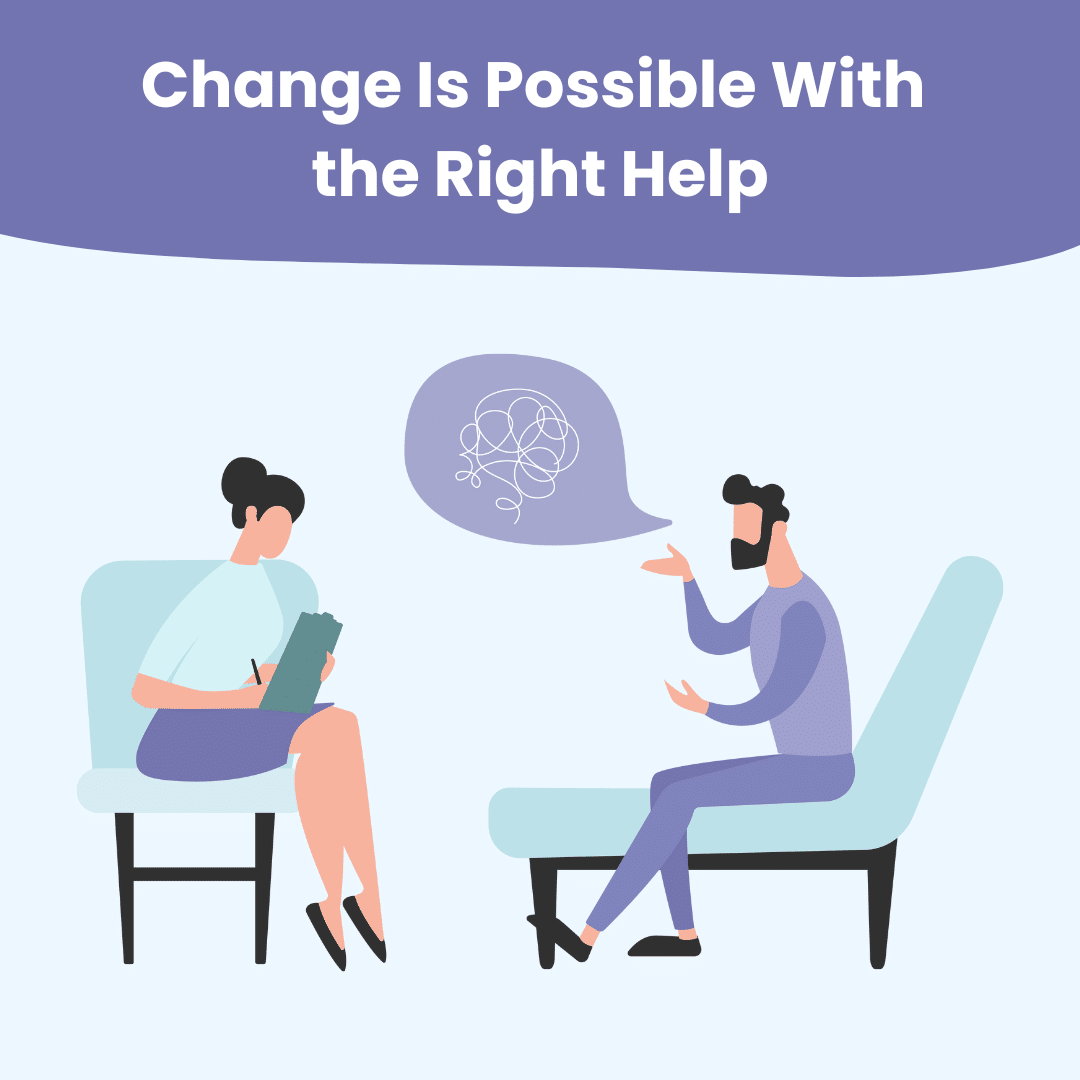
- Published on 29 May 2025
Living with depression can often feel like carrying an invisible weight – one that’s hard to name and even harder to put down. You may not always know what’s wrong, but you can tell that something isn’t quite right.
Perhaps you’ve thought of starting counselling, but it can be a huge step when you’re already struggling. You may face questions and doubts like:
- Do I really need therapy?
- What type of counselling should I choose?
- Does therapy work?
We’re here to help make the process of seeking help and healing easier for you.
In this blog, we’ll walk you through four of the most common types of counselling for depression, when you should consider seeing a counsellor in Singapore and why online counselling can be an accessible and effective option.
This Article Contains:
Counselling for Depression: 4 Approaches to Consider
1) Cognitive Behavioural Therapy (CBT)
If you’re struggling with depression, you may often find yourself caught in a loop of negative self-talk or assumptions about yourself, others, and the future. These patterns, though unintentional, can deeply affect your emotions and behaviours.
Cognitive Behavioural Therapy (CBT) can help you become aware of these negative thought patterns, known as cognitive distortions, and challenge them actively and gradually.
This type of counselling teaches you to notice your automatic responses, acknowledge cognitive distortions, reframe unhelpful thoughts and beliefs, and take small but steady steps towards your goals.
CBT is one of the most widely used evidence-based approaches of counselling for depression and is particularly helpful for those who:
- Experience recurring cycles of negative thinking
- Struggle with guilt, hopelessness, apathy or low self-esteem and self-worth
- Want to understand how their thoughts influence mood and behaviour
Try This
Try noticing your automatic thoughts that pop up in response to situations for a week. Often, these may be self-criticisms.
Keep a journal to note these down – the situation + your automatic thought(s).
Read and understand different types of cognitive distortions.
At the end of the week, spend some time reflecting on these thought patterns and ask yourself the following questions:
- What kind of cognitive distortion does this thought fall under? Eg overgeneralisation, all-or-nothing thinking, fortune teller error, etc.
- How did you feel at that moment when you were having the thought?
- How true is the thought or belief? What’s the evidence for and against it?
- Can you reframe it with a more balanced or rational response?
- How do you feel at the end of the exercise?
2) Behavioural Therapy & Behavioural Activation
When you’re dealing with depression, even the smallest tasks like getting out of bed, replying to messages or eating a meal can feel overwhelming. You may slowly withdraw from activities that once brought you joy and meaning.
Behavioural therapy and behavioural activation can help you gradually find your way back to yourself, finding motivation through movement, action and routine.
While other types of counselling may focus more on talking, behavioural therapy is more action-driven. It rewards and encourages engagement in activities that make you feel better while discouraging activities that make you feel worse.
This type of counselling may be ideal for you if you:
- Feel like you’ve lost interest in everyday activities
- Feel stuck in a cycle of avoidance, inactivity and low motivation
- Want to do certain activities, but can’t bring yourself to
Try This
Pick one simple activity that used to bring you a sense of joy or accomplishment (e.g. making your favourite drink or going for a walk).
Plan to do it at a specific time tomorrow – break it down into smaller steps if needed.
Give yourself small rewards for each action taken towards this activity and when you complete it.
Even such small actions can make a big difference in lifting your mood when done consistently.
3) Psychodynamic Therapy
Sometimes, depression can be due to deeper emotional reasons, perhaps tied to early childhood experiences, unresolved grief, or recurring patterns in relationships.
Psychodynamic counselling helps you explore these underlying issues and understand the real reasons why you’re feeling the way you are.
While you may initially work on surface-level symptoms, a psychodynamic therapist will also encourage you to look inward, helping you uncover patterns from your past that may be influencing your present.
Psychodynamic counselling provides a safe space for building understanding, self-awareness, and emotional resilience over time. It may be beneficial for those who:
- Have struggled with depression for many years
- Want to understand the ‘why’ behind recurring struggles
- Don’t have as many presenting symptoms
- Are looking for deeper answers as opposed to practical strategies
Try This
Start paying attention to emotional reactions that seem stronger than the situation warrants – for example, feeling deeply hurt by minor criticism or feeling abandoned when someone cancels plans.
These moments may hold clues to unresolved past experiences that psychodynamic counselling can help you explore and address.
4) Mindfulness-Based Cognitive Therapy (MBCT)
Mindfulness-Based Cognitive Therapy (MBCT) combines elements of CBT with mindfulness practices, teaching you to observe your thoughts and emotions without judgment.
The goal of this counselling approach isn’t to stop negative thoughts altogether, but to change your relationship with them, learning to notice them and let them pass, rather than spiralling.
MBCT may be the ideal type of counselling for you if you:
- Tend to overthink or ruminate
- Are prone to recurrent episodes of depression
- Want to build emotional awareness, resilience and self-compassion
Try This
Try a 2-minute breathing exercise today. Sit comfortably, either lying down, sitting in a chair or cross-legged on a mat. Close your eyes and simply observe your breath.
If your mind wanders, tell yourself it’s okay and gently bring it back to your breath – no judgment, just awareness.
Small, mindful pauses such as these can be surprisingly grounding. Over time, you can start pausing for longer periods, at your own pace.

When to Seek Counselling for Depression
We’re here to remind you that you don’t need to tick off a checklist or wait until things get ‘bad enough’ to start counselling in Singapore. If you feel like you’re struggling – be it in quiet or big ways – that’s reason enough to reach out for help.
There’s no single way that depression looks or feels. For some, it’s a persistent heaviness that doesn’t even let you get out of bed. For others, it’s a quiet sense of disconnection, irritability, or emotional emptiness. For others still, it may not even be visible on the outside.
Whether your experience is loud or silent, obvious or hidden, remember that it’s all valid. Counselling isn’t just for moments of crisis. It can also be a space to understand what you’re feeling and start healing, even if you’re not sure what’s wrong.
That said, here are some red flags to be mindful of — gentle signals that may show extra support through counselling could be helpful:
- You often feel tired, low, or drained, even after getting enough rest.
- You’ve lost motivation and interest in things that usually bring you joy.
- You find yourself withdrawing from people or avoiding social interaction.
- You’re battling feelings of guilt, worthlessness, or self-doubt.
- You’re stuck in a loop of overthinking or harsh self-criticism.
- You’re using distractions or unhealthy habits just to get through the day.
- Your sleep, appetite, or energy levels have noticeably changed.
- You’re feeling emotionally numb, overwhelmed, or unusually irritable.
Frequently Asked Questions (FAQS)
1) Do I need a formal diagnosis to start counselling for depression?
Not at all! You don’t need a label, diagnosis, or hit a certain ‘low’ to start counselling for depression.
If you’re feeling sad, unmotivated, anxious, numb, or simply not yourself, counselling can help. You deserve support, no matter what you’re going through.
2) What happens during a counselling session for depression?
Counselling sessions in Singapore typically involve open conversations about your thoughts, emotions, and life experiences.
Your counsellor may guide you using specific tools or techniques based on the type of therapy (such as CBT or MBCT), but everything happens at your pace, making sure you feel safe, comfortable and supported.
3) Does counselling help with depression? How long can it take to see results?
Yes, counselling can be greatly helpful in managing and reducing symptoms of depression, recovering from it and developing long-term coping strategies.
The timeline for seeing results may vary depending on the severity of your symptoms, the type of therapy you’re engaging in, and your therapy goals.
Some people find relief within a couple of counselling sessions, while for others, it’s a longer journey.
Although there’s no fixed timeline, most people start seeing positive results after around 15–20 counselling sessions.
4) Is everything I say in therapy confidential?
Yes. Counsellors are bound by strict confidentiality guidelines. What you share during your counselling sessions stays between you and your therapist, with very few necessary exceptions (such as risk of harm to yourself or others).
At Talk Your Heart Out (TYHO), our counsellors always prioritise your privacy, safety and comfort.
5) Can online counselling really help with depression?
Absolutely! Online counselling offers the same level of professional care and support as in-person therapy.
In fact, for many people, online counselling feels more accessible and flexible, which can be especially helpful when depression makes it hard to leave the house or stick to a routine.
6) How do I know which type of counselling is right for me?
You don’t have to figure it all out on your own.
Your therapist will assess your needs during the first few sessions and suggest a counselling approach that aligns with your goals, be it CBT, psychodynamic therapy, MBCT, or a combination of different methods.

Conclusion
Depression can feel like a heavy and invisible burden, but remember that you don’t have to carry it alone.
Counselling offers a safe space for you to breathe, feel seen, and begin healing at your own pace and in your own time.
If you’re still feeling unsure, read our blog on how therapy in Singapore can help with Depression.
When you feel ready to start your healing journey, click here to explore counselling for depression at TYHO💜

Related Articles
Latest Articles
Recent Posts
- Understanding Employee Assistance Programs in Singapore (And Why Your Company Needs One)
- A Therapist’s Guide to Setting Boundaries with Parents
- Anger Management in Singapore: Top 6 Benefits
- Individual vs Group Counselling in Singapore: What’s Right for You?
- Thinking of Switching Your Therapist in Singapore? Read This First


